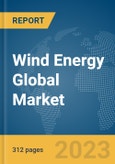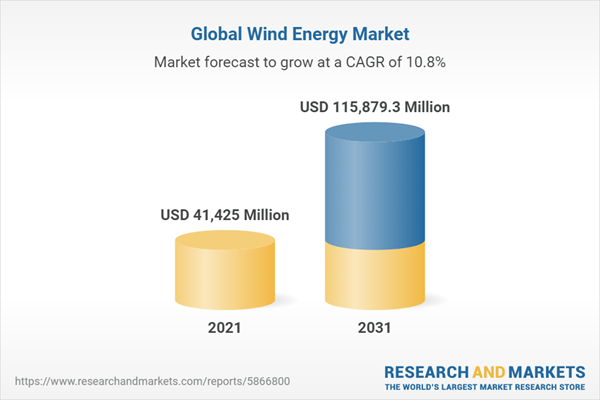The global wind energy market reached a value of nearly $41,425.0 million in 2022, having increased at a compound annual growth rate (CAGR) of 9.8% since 2017. The market is expected to grow from $41,425.0 million in 2022 to $69,839.9 million in 2027 at a rate of 11.0%. The market is then expected to grow at a CAGR of 10.7% from 2027 and reach $115,879.3 million in 2032.
Growth in the historic period resulted from emerging markets growth, increased demand for clean energy sources, high environmental impact of conventional power generation sources and increasing fuel costs. Factors that negatively affected growth in the historic period were the impact of COVID-19, stringent regulations and high costs of wind turbines.
Going forward, strong government support, global population growth and urbanization, the increasing electricity demand and the increasing focus on alternative sources of power generation will drive the market. Factors that could hinder the growth of the wind energy market in the future include the impact of the Russia-Ukraine war and the delay in wind projects under construction.
The wind energy market is segmented by turbine type into horizontal axis and vertical axis. The horizontal axis market was the largest segment of the wind energy market by turbine type, accounting for $40,148.7 million or 96.9% of the total market in 2022. The vertical axis market is expected to be the fastest-growing segment going forward at a CAGR of 12.4%.
The wind energy market is segmented by component into turbine, support structure, electrical infrastructure and other components. The turbine market was the largest segment of the wind energy market by component, accounting for $20,486.6 million or 49.5% of the total market in 2022. The electrical infrastructure market is expected to be the fastest-growing segment going forward at a CAGR of 11.8 %.
The wind energy market is segmented by application into utility and non-utility. The utility market was the largest segment of the wind energy market by applications, accounting for $35,616.1 million or 86.0% of the total market in 2022. It is expected to be the fastest-growing segment going forward at a CAGR of 11.1%.
The wind energy market is segmented by location into onshore and offshore. The onshore market was the largest segment of the wind energy market by location, accounting for $38,525.26 million or 93.0% of the total market in 2022. The offshore market is expected to be the fastest-growing segment going forward at a CAGR of 14.3%.
Asia Pacific was the largest region in the wind energy market, accounting for 49.9% of the global market in 2022. It was followed by Western Europe, North America and the other regions. Going forward, the fastest growing regions in the wind energy market will be the Middle East and Africa, where growth will be at CAGRs of 15.1% and 14.1% respectively from 2022-2027.
The global wind energy market is highly concentrated, with large players operating in the market. The top ten competitors in the market made up to 85.15% of the total market in 2021. Siemens Energy AG was the largest competitor with 18.58% share of the market, followed by Xinjiang Goldwind Science & Technology Co. Ltd. with 15.61%, General Electric Company with 14.06%, Vestas Wind Systems A/S with 11.99%, Nordex SE with 9.88%, Enercon GmbH with 6.97%, China Ming Yang with 2.72%, Suzlon Energy Ltd. with 1.97%, Dongfang Electric Corporation Limited with 1.87%, and ABB Limited with 1.49%.
The top opportunities in the wind energy market by turbine type will arise in the horizontal axis market, which will gain $27,400.3 million of global annual sales by 2027. The top opportunities in the wind energy market by component will arise in the turbine market, which will gain $14,315.0 million of global annual sales by 2027. The top opportunities in the wind energy market by application will arise in the utility market, which will gain $24,761.4 million of global annual sales by 2027. The top opportunities in the wind energy market by location will arise in the onshore market, which will gain $25,698.9 million of global annual sales by 2027. The wind energy market size will gain the most in the China at $13,751.8 million.
Market-trend-based strategies for the wind energy market include wind-solar hybrid systems, robot inspection systems, recyclable wind turbines, use of artificial intelligence (AI), new plant expansions, product innovations and collaborations and acquisitions.
Player-adopted strategies in the wind energy industry include reducing the carbon footprint in the wind industry through the launch of new products, strengthening business capabilities through strategic collaborations and partnerships and enhancing operational capabilities through receiving new orders.
To take advantage of the opportunities, the publisher recommends the wind energy companies to focus on wind-solar hybrid systems, focus on robot inspection systems, focus on recyclable wind turbines, focus on use of artificial intelligence (AI), focus on product innovations, continue to focus on developed markets, expanding in emerging markets, focus on expanding through collaborations, provide competitively priced offerings, participate in trade shows and events, continue to use B2B promotions, focus on urban population, and target governments.
Table of Contents
Executive Summary
Wind Energy Global Market Opportunities and Strategies To 2032 provides the strategists; marketers and senior management with the critical information they need to assess the global wind energy market as it emerges from the COVID-19 shut down.Reasons to Purchase
- Gain a truly global perspective with the most comprehensive report available on this market covering 12 geographies.
- Understand how the market is being affected by the coronavirus and how it is likely to emerge and grow as the impact of the virus abates.
- Create regional and country strategies on the basis of local data and analysis.
- Identify growth segments for investment.
- Outperform competitors using forecast data and the drivers and trends shaping the market.
- Understand customers based on the latest market research findings.
- Benchmark performance against key competitors.
- Utilize the relationships between key data sets for superior strategizing.
- Suitable for supporting your internal and external presentations with reliable high-quality data and analysis
Description:
Where is the largest and fastest-growing market for wind energy? How does the market relate to the overall economy; demography and other similar markets? What forces will shape the market going forward? The wind energy market global report answers all these questions and many more.The report covers market characteristics; size and growth; segmentation; regional and country breakdowns; competitive landscape; market shares; trends and strategies for this market. It traces the market's history and forecasts market growth by geography. It places the market within the context of the wider wind energy market; and compares it with other markets.
The report covers the following chapters
- Introduction and Market Characteristics - Brief introduction to the segmentations covered in the market, definitions and explanations about the wind energy market.
- Key Trends - Highlights the major trends shaping the global wind energy market. This section also highlights likely future developments in the market.
- Global Market Size and Growth- Global historic (2017-2022) and forecast (2022-2027, 2032F) market values, and drivers and restraints that support and control the growth of the market in the historic and forecast periods.
- Regional Analysis - Historic (2017-2022) and forecast (2022-2027, 2032F) market values and growth and market share comparison by region.
- Market Segmentation - Contains the market values (2017-2022) (2022-2027, 2032) and analysis for each segment by turbine type, by component, by location and by application in the market.
- Regional Market Size and Growth - Regional market size (2022), historic (2017-2022) and forecast (2022-2027, 2032F) market values, and growth and market share comparison of countries within the region. This report includes information on all the regions Asia-Pacific, Western Europe, Eastern Europe, North America, South America, Middle East and Africa and major countries within each region.
- Competitive Landscape - Details on the competitive landscape of the market, estimated market shares and company profiles of the leading players.
- Key Mergers and Acquisitions - Information on recent mergers and acquisitions in the market covered in the report. This section gives key financial details of mergers and acquisitions, which have shaped the market in recent years.
- Market Opportunities and Strategies - Describes market opportunities and strategies based on findings of the research, with information on growth opportunities across countries, segments and strategies to be followed in those markets.
- Conclusions and Recommendations - Includes recommendations for wind energy providers in terms of product/service offerings geographic expansion, marketing strategies and target groups.
- Appendix - This section includes details on the NAICS codes covered, abbreviations and currencies codes used in this report.
Scope
Markets Covered:
1) By Turbine Type: Horizontal Axis; Vertical Axis2) By Component: Turbine; Support Structure; Electrical Infrastructure; Other Components
3) By Location: Onshore; Offshore
4) By Application: Utility; Non-Utility
Companies Mentioned: Siemens Energy AG; Xinjiang Goldwind Science & Technology Co. Ltd; General Electric Company; Vestas Wind Systems A/S; Nordex SE
Countries: China; Australia; India; Indonesia; Japan; South Korea; USA; Brazil; France; Germany; UK; Russia
Regions: Asia-Pacific; Western Europe; Eastern Europe; North America; South America; Middle East; Africa
Time-series: Five years historic and ten years forecast.
Data: Ratios of market size and growth to related markets; GDP proportions; expenditure per capita; wind energy indicators comparison.
Data segmentations: country and regional historic and forecast data; market share of competitors; market segments.
Sourcing and Referencing: Data and analysis throughout the report is sourced using end notes.
Companies Mentioned
- Siemens Energy AG
- Xinjiang Goldwind Science & Technology Co. Ltd
- General Electric Company
- Vestas Wind Systems A/S
- Nordex SE
Table Information
| Report Attribute | Details |
|---|---|
| No. of Pages | 312 |
| Published | August 2023 |
| Forecast Period | 2021 - 2031 |
| Estimated Market Value ( USD | $ 41425 Million |
| Forecasted Market Value ( USD | $ 115879.3 Million |
| Compound Annual Growth Rate | 10.8% |
| Regions Covered | Global |
| No. of Companies Mentioned | 5 |









